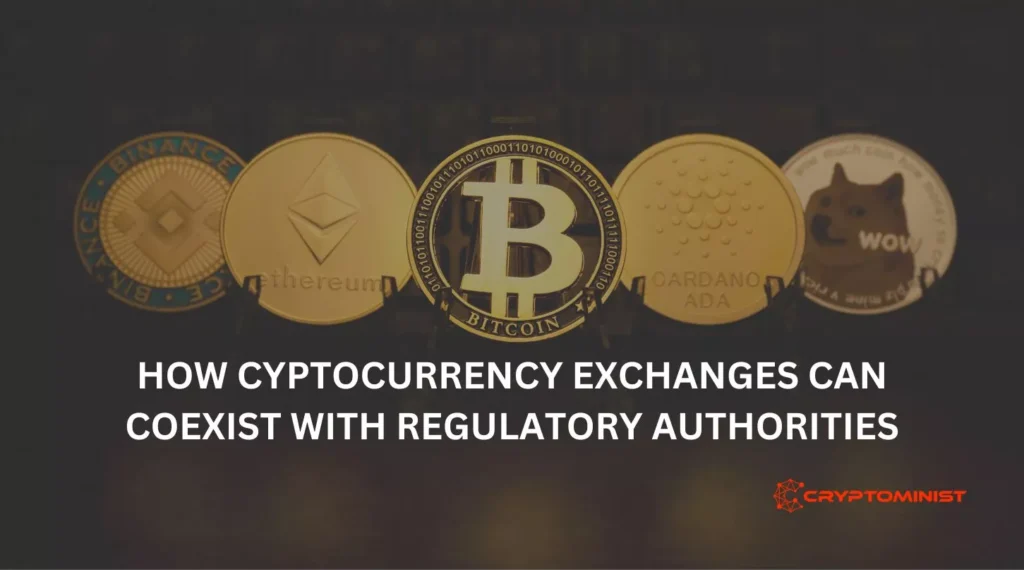Cryptocurrency exchanges, the online platforms that enable users to buy, sell, and trade cryptocurrencies, operate in a rapidly evolving and complex regulatory landscape. As digital currencies gain popularity and continue to disrupt traditional financial systems, governments and regulatory authorities are taking a more active interest in overseeing the cryptocurrency space.
This article explores how cryptocurrency exchanges can coexist with regulatory authorities, fostering a more secure and sustainable crypto ecosystem.
The Regulatory Challenge
The emergence of cryptocurrencies, led by Bitcoin’s release in 2009, introduced a new paradigm of decentralized and borderless financial systems. However, this innovation also posed challenges for regulatory authorities worldwide. Cryptocurrencies, characterized by their pseudonymous and decentralized nature, can be used for a wide range of activities, from online purchases to investments and even illicit actions.
Cryptocurrency regulations have developed at different paces around the globe, ranging from outright bans to comprehensive legal frameworks. These regulations encompass areas such as consumer protection, anti-money laundering (AML), and countering the financing of terrorism (CFT).
Ways Cryptocurrency Exchanges Can Coexist with Regulations
Cryptocurrency exchanges play a pivotal role in fostering cooperation with regulatory authorities. Here are key strategies for exchanges to coexist harmoniously with these regulators:
1. KYC and AML Compliance
Know Your Customer (KYC) and Anti-Money Laundering (AML) procedures are fundamental to safeguarding the integrity of cryptocurrency exchanges. These regulations require exchanges to verify the identities of their users, monitor transactions for suspicious activity, and report such activities to relevant authorities. By complying with these requirements, exchanges demonstrate a commitment to deterring illegal activities and protecting users.
2. Licensing and Registration
Many countries require cryptocurrency exchanges to obtain licenses or register with regulatory authorities. This process typically involves background checks, financial audits, and adherence to specific operational standards. By securing licenses, exchanges can gain legitimacy in the eyes of both users and regulators.
3. Regulatory Reporting
Exchanges should maintain clear records of user transactions and be prepared to furnish this information when requested by authorities. Regulatory reporting helps combat fraudulent activities, tax evasion, and other financial crimes. It also demonstrates a willingness to cooperate with regulators.
4. Security Measures
Robust cybersecurity measures are essential to protect user funds and data. Exchanges that prioritize security can reduce the risk of hacks and fraudulent activities, which can lead to financial losses and damage their reputation. Regulatory authorities often encourage or mandate such measures.
5. Educating Users
Cryptocurrency exchanges can contribute to the coexistence with regulations by educating users about the legal and security aspects of cryptocurrency. By providing educational resources and promoting responsible trading practices, exchanges help users understand the potential risks and regulations they may encounter.
6. Advocating for Clear Regulations
Engaging with regulatory authorities to advocate for well-defined and reasonable regulations is in the best interest of the cryptocurrency ecosystem. Exchanges can provide valuable input on regulatory matters, as they have practical experience in the field. They can participate in public consultations and collaborate with industry associations to shape the regulatory landscape.
7. Developing Compliance Departments
Establishing dedicated compliance departments within exchanges can help ensure that all regulatory requirements are met. Compliance officers can stay updated on evolving regulations and streamline the exchange’s adherence to these standards.
8. Geographic Diversification
Cryptocurrency exchanges can consider geographic diversification by expanding into regions with clear and favorable regulations. Operating in multiple jurisdictions allows exchanges to adapt to varying regulatory environments while providing users with access to a global market.
Challenges and Future Outlook
While coexisting with regulatory authorities is essential for the long-term sustainability of cryptocurrency exchanges, it’s not without its challenges. Some of these challenges include:
- Lack of Uniformity: Regulations can vary significantly from one country to another, creating compliance challenges for exchanges that operate globally.
- Evolving Regulations: Cryptocurrency regulations are continuously evolving. Exchanges must stay current with changes in the regulatory landscape to remain compliant.
- Customer Privacy Concerns: Balancing KYC/AML requirements with user privacy can be a delicate task. Exchanges must find ways to adhere to regulations while respecting users’ privacy rights.
- Compliance Costs: Meeting regulatory requirements often incurs substantial costs, which can be a burden for exchanges, especially smaller ones.
The future of cryptocurrency exchange regulation is likely to involve further refinement and global harmonization of standards. As cryptocurrencies become more integrated into mainstream financial systems, regulators and exchanges will need to work closely to ensure a balanced approach that maintains the innovation and accessibility of cryptocurrencies while minimizing potential risks.
Conclusion
Cryptocurrency exchanges and regulatory authorities can coexist through mutual cooperation. Exchanges that prioritize compliance, security, and user education contribute to a more secure and trustworthy cryptocurrency ecosystem. By actively engaging with regulators and advocating for clear, fair, and practical regulations, exchanges can help shape the future of the cryptocurrency industry and foster a harmonious relationship with authorities.
If you like reading the above article, you may also like reading:
CENTRALIZED VS. DECENTRALIZED EXCHANGES: SIX DIFFERENCES TO CONSIDER







